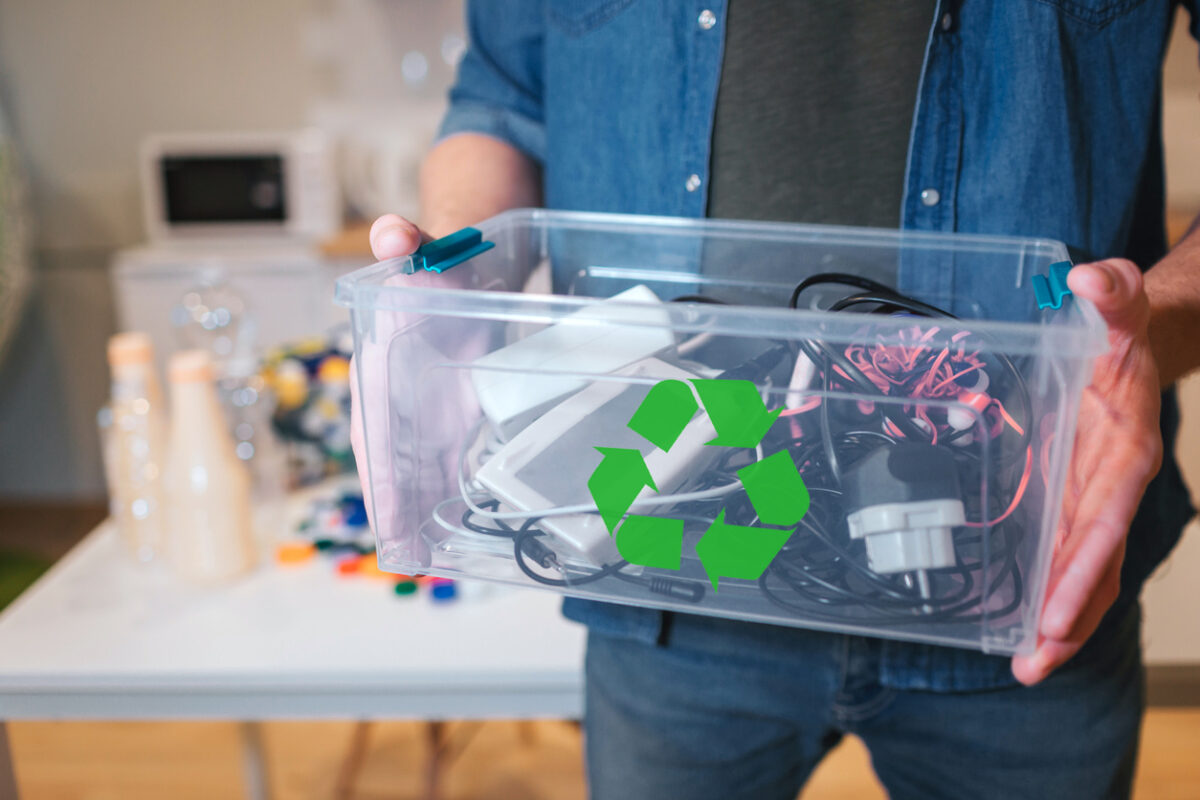We may earn revenue from the products available on this page and participate in affiliate programs. Learn More ›
As consumers, we create a massive amount of waste, filling up landfills with all of the products we’ve used and thrown away. While most people have a recycling bin along with their trash bin, they might not realize that many stores they frequent offer exceptional recycling programs for the items that can’t go in the recycling container.
These major retailers have robust recycling programs that can refurbish and reuse your old clothes, smartphones, rechargeable batteries, or furniture. And, for items that aren’t reusable, the retailers partner with recycling companies that can break them down into their base components to create a variety of other products.
“These sort of recycling programs are of huge importance,” says Paula Napolitano, product sales manager at Wisetek, a major Ireland-based distributor of refurbished and recycled electronics. “Last year there were around 59 million metric tons of e-waste generated globally, which is hugely impacting the environment. If large amounts of old electronics are allowed to build up in landfills, they can eventually begin to leach toxic materials into the soil, which may seriously harm the surrounding environment,” Napolitano says.
While lowering the impact you have on the local landfill is reason enough to hand off unwanted furniture, bedsheets, tablets, or rechargeable batteries to these retailers, you might be surprised to know that many of these companies offer additional incentives in the form of coupons, gift cards, and trade-in deals. Ahead, learn more about some of the top retailers who will take your unwanted stuff.
1. Best Buy
The big-box appliance and electronics giant is a leader in recycling, reusing, or repurposing, to the tune of 2.7 billion pounds of e-waste and appliances since 2009. You can drop off old electronics like computers, smartphones, radios, and more at any of Best Buy’s more than 1,000 locations and receive special promotions off certain products in the store. You can even earn gift cards for those items that still have value. Best Buy will also haul old TVs, fitness equipment, and appliances away for a nominal fee when you buy new ones.
“You can recycle up to three items per household per day,” says Alejandra Valeriano, public relations representative for Best Buy. “For $199.99, we’ll haul away and recycle up to a total of two large products (including TVs, major appliances, all-in-one computers and monitors), along with an unlimited number of select smaller products,” Valeriano says. Best Buy partners with Electronic Recyclers International, which breaks down electronics into materials that can be repurposed for use in everything from fiber optic cables to airplanes.
RELATED: I Started Recycling in 2023—Here’s Why It’s Not What I Expected
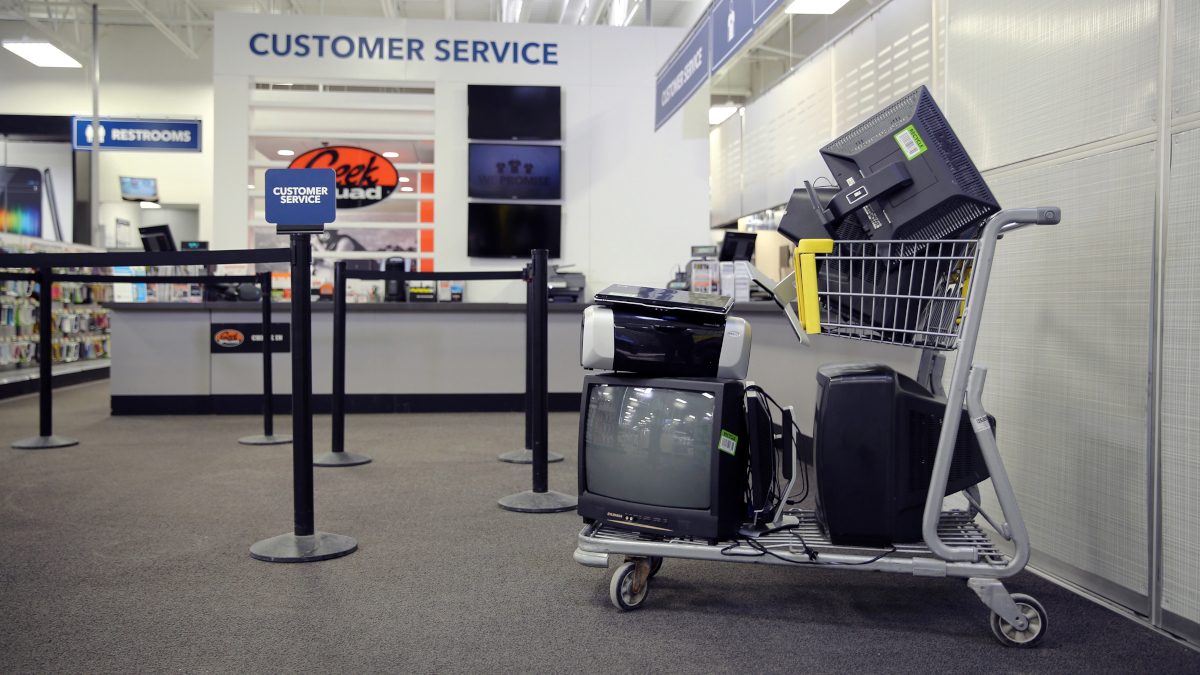
2. The Home Depot
Few retailers have as robust a recycling program as home improvement giant The Home Depot, which recycles a variety of disposable products. The company partners with nonprofit recycling company Call2Recycle to recycle old lithium-ion batteries that customers can drop off at any of the home improvement retailer’s locations. The Home Depot also collects plastic bags, which it supplies to Trex, the composite decking manufacturer in turn uses the materials in the construction of its products.
In 2017 alone, The Home Depot recycled 1.1 million pounds of rechargeable batteries and 200,000 acid battery cores. The Home Depot also has recycling programs for compact fluorescent lamp (CFL) light bulbs and cardboard boxes.
3. Staples
Not only will Staples recycle your old office supplies and electronics, they’ll pay you for it. Since 2012, Staples has recycled nearly 166 million pounds of technology. “Staples wants to make recycling easier for everyone across the U.S.,” says Mike Sauchuk, senior director of recycling and sustainability of Staples. “There are many items out there that we use every day that can be recycled, but it can be challenging to find a place to recycle them. That’s where Staples steps in. We offer free recycling for many hard-to-recycle items like technology, writing instruments, phone cases, and more. There’s no more waiting for your town’s local recycling day or event. At Staples, it’s recycling day every day.”
Through the Staples Rewards program, you can earn $5 back in rewards when you recycle tech and $2 back on every recycled ink or toner cartridge brought to one of the store’s more than 1,000 locations. In addition, the retailer will take unwanted electronics and worn-out rechargeable batteries for free.
4. Walmart
Like other retailers, Walmart will take used cell phones, Bluetooth speakers, laptops, gaming consoles, tablets, and other devices through its trade-in program. Simply input info about the device on the Walmart website, get an offer for it, then ship it for free via FedEx or UPS Ground using a preprinted label. You receive an instant Walmart gift card for your efforts.
5. Advance Auto Parts
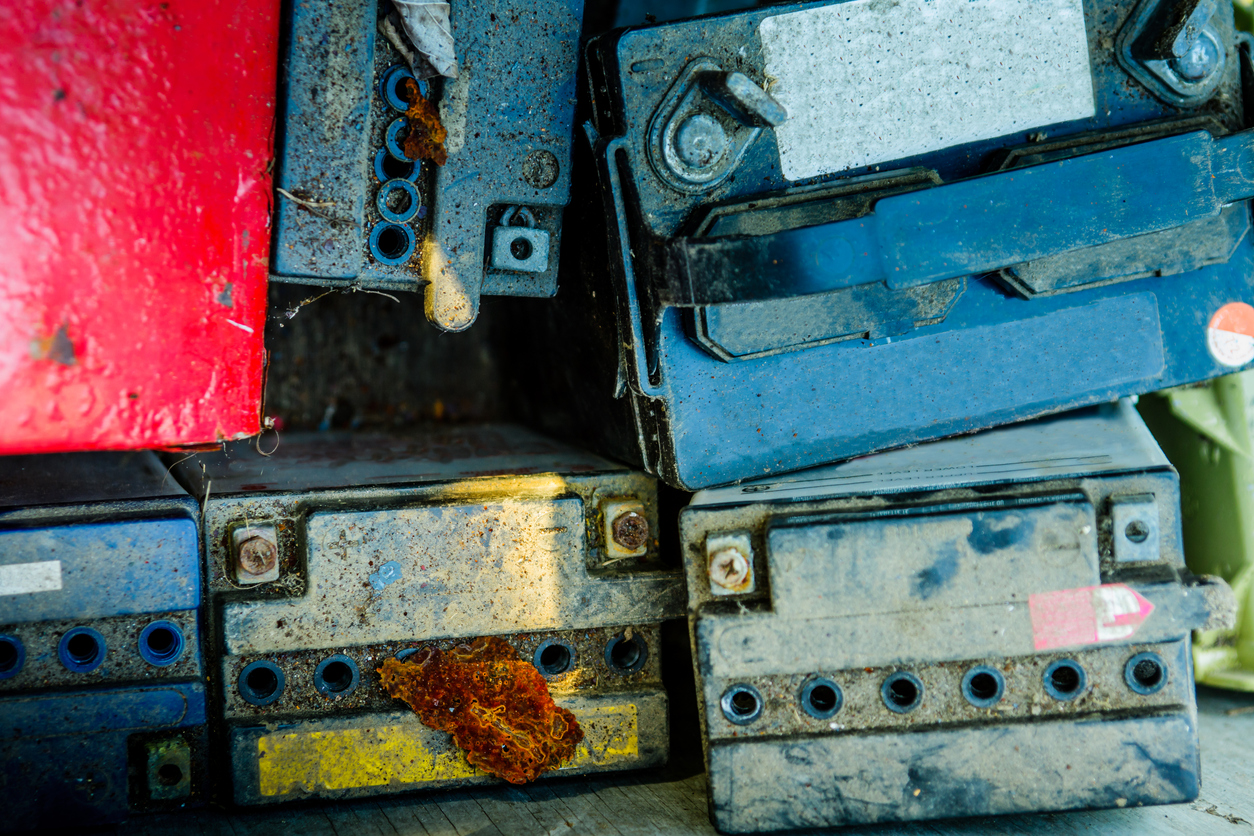
The presence of mercury, cadmium, lithium, and lead in car batteries ranks these vital components of cars and trucks among the more harmful products for the environment. Advance Auto Parts knows this, and therefore the company offers a nice incentive for bringing in your old battery once it dies. Take the worn-out battery to any Advance store and you’ll get a $10 gift card, which you can put toward the cost of a new battery or anything else in the store. The old batteries are then used to manufacture new ones.
6. Apple
While Apple’s products might be on the more expensive side when it comes to consumer electronics, they hold some of their value. That’s because the company makes it easy to cash in on that old iPhone, iPad, Macbook, or Apple Watch by allowing owners of the devices to trade their electronics in at an Apple Store or online. In return, Apple gives the customer store credit (Apple will also recycle other brands of electronics for free).
If the device is in good shape, it will be refurbished and sold to a new owner. Those that can’t be reused go to one of Apple’s recycling partners, where they are broken down and recycled. Many iPhones end up with Daisy, Apple’s disassembly robot, which is designed to recover a device’s usable parts.
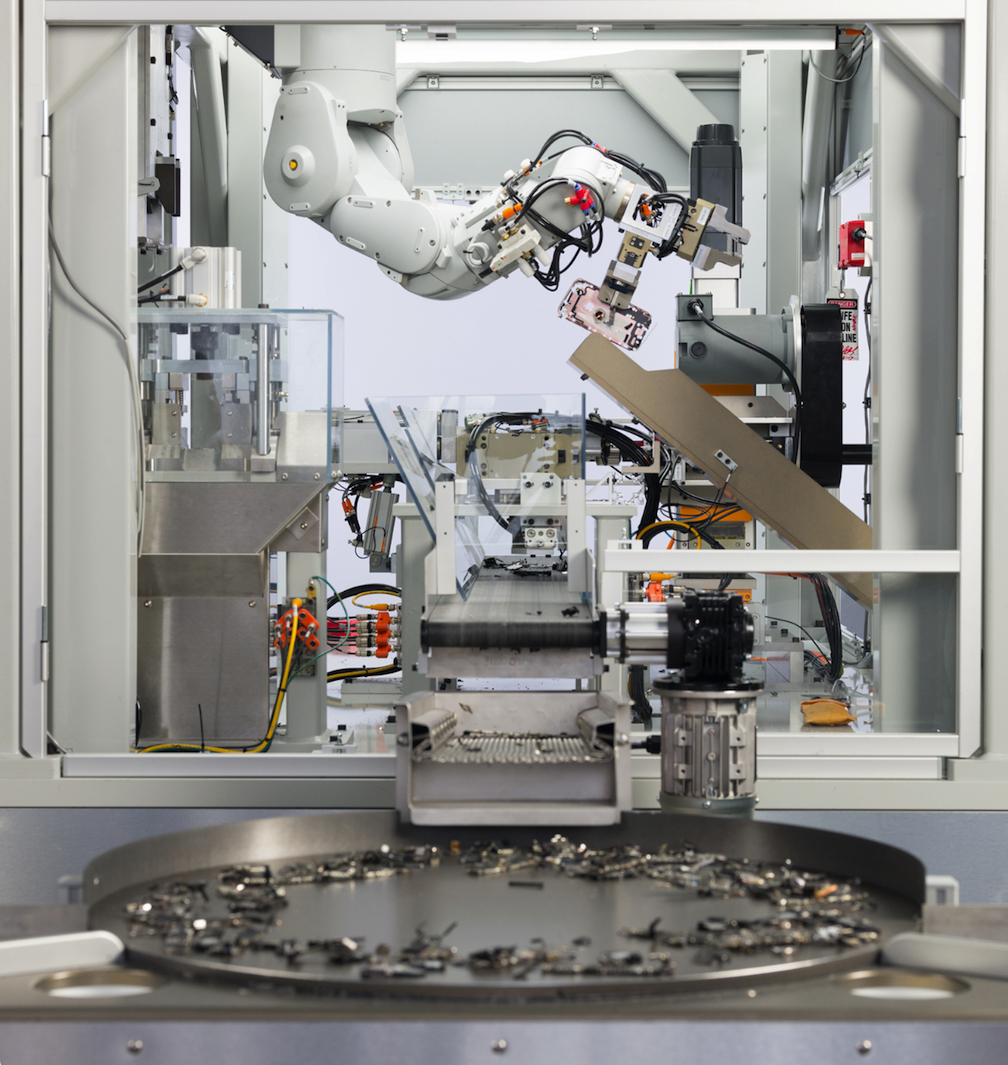
7. Habitat ReStores
Habitat for Humanity’s ReStore has more than 900 locations nationwide, all of which will take appliances, furniture, various household items, and even building materials. Habitat then resells these items in its store and uses the proceeds to build affordable homes for families. “New and gently used items donated to a Habitat ReStore are resold to the community at a fraction of retail prices and help to support Habitat for Humanity’s vision of a world where everyone has a decent place to live,” says Jared Williams, communications manager at Habitat for Humanity International.
According to Williams, “Habitat ReStores tend to accept both new and gently used household items and building materials, which can include a wide variety of products.” He adds that donations come from all kinds of sources, “from neighbors completing home projects to restaurants after a remodel.” Habitat might not offer you a gift card for your stuff, but you can take tax deductions for your donations, since Habitat is a nonprofit organization.
RELATED: Don’t Throw Your Old Christmas Lights in the Trash—Do This Instead
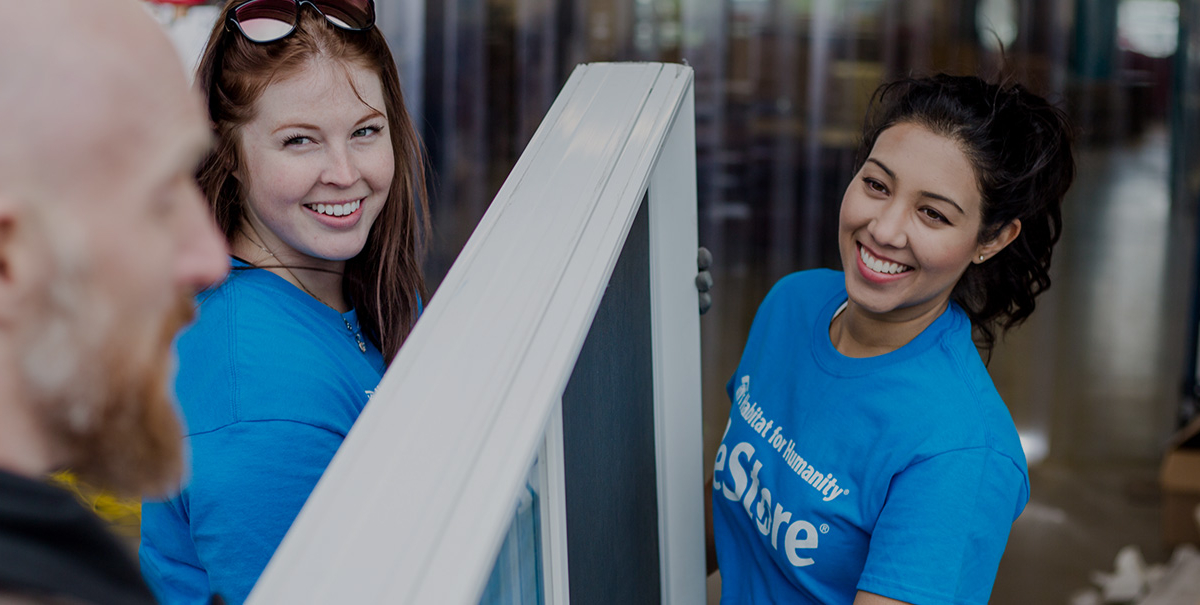
8. Amazon
Ever wonder where the used products Amazon sells come from? The online retailing behemoth accepts your old electronics and devices, including Bluetooth speakers and headphones, home security devices, wireless routers, and gaming systems. The company will even reward you with gift cards for gently used electronics that it can refurbish and resell. Amazon also takes some products that are no longer functioning. The company will recycle a variety of electronic devices for free, even covering the cost of shipping them to Amazon via UPS.
9. H&M
Bedding, unmatched socks, old T-shirts—clothing retailer H&M will take all linens as part of the company’s recycling program. Since 2013, H&M has collected more than 155,000 tons of textiles. The items were either cleaned and reused as second-hand clothing, turned into other products such as cleaning rags, or recycled into materials like insulation. When you drop off a bag of used clothing at H&M, the company will give you a coupon toward your next purchase at their store.
10. HP
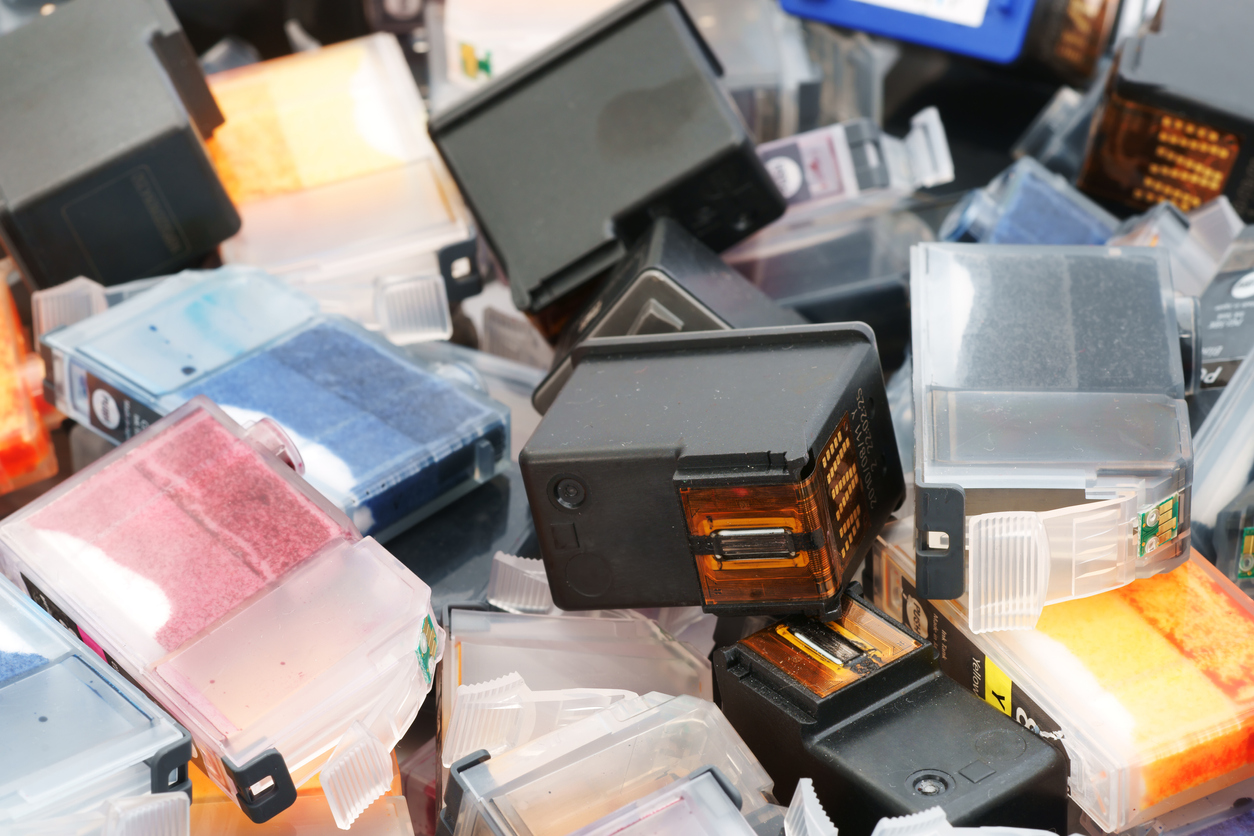
More than 1 billion HP ink and toner cartridges have been recycled by customers through the company’s HP Planet Partners program. The program aims to give a second life to HP’s end-of-life equipment and printing supplies and to reduce the environmental impact of electronic waste and greenhouse gas emissions. Simply drop off your HP ink and toner supplies at a location near you, mail them back, or request a pickup if you have a large quantity of supplies to give back.
11. Nespresso
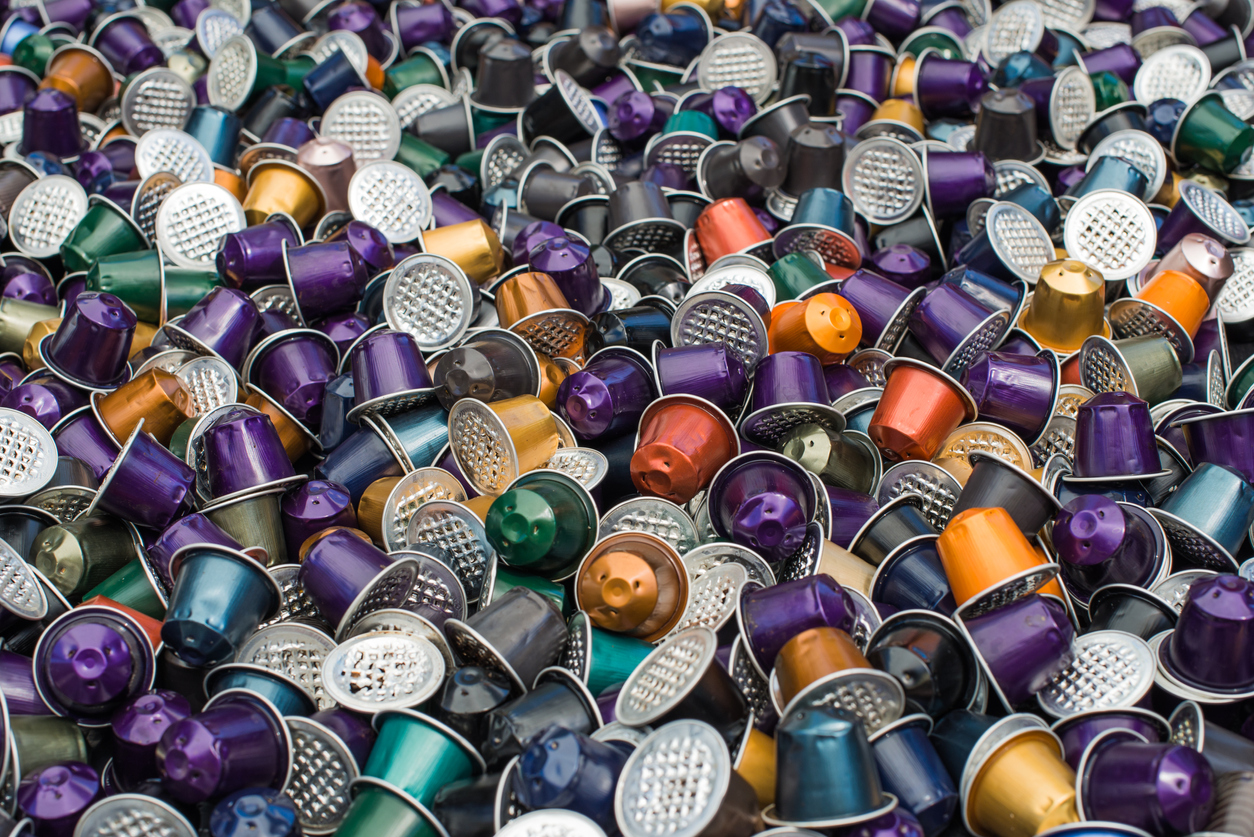
Calling all coffee enthusiasts! If you own a Nespresso machine, you might be familiar with the company’s recycling program. Fill a Nespresso recycling bag (available for free at any Nespresso store) with your used capsules and drop them off at one of the 120,000-plus collection points around the world. The aluminum from the pods is recycled into a variety of items such as bicycles, computers, soda cans, and more, while the used coffee grounds go toward creating compost or green energy.
12. Kroger
Kroger recognizes that most shoppers throw out plastic grocery bags and packaging after shopping, so they’ve put a special system in place for customers to take your discarded grocery bags and packaging and recycle them responsibly. The retail giant provides convenient drop-off bins to recycle plastic. The grocery chain has recycled more than 180 million pounds of plastic and aims to eliminate single-use plastic grocery bags in all of their stores by 2025.
13. Williams-Sonoma
Williams-Sonoma has a variety of initiatives dedicated to creating a more circular economy. The company works with donation programs like Good360 to give away returned and unsold products to local nonprofit organizations and others. They are also exploring rental and resale business models to give a second life to products like bedding, curtains, throws, pillows, linens, and more.

